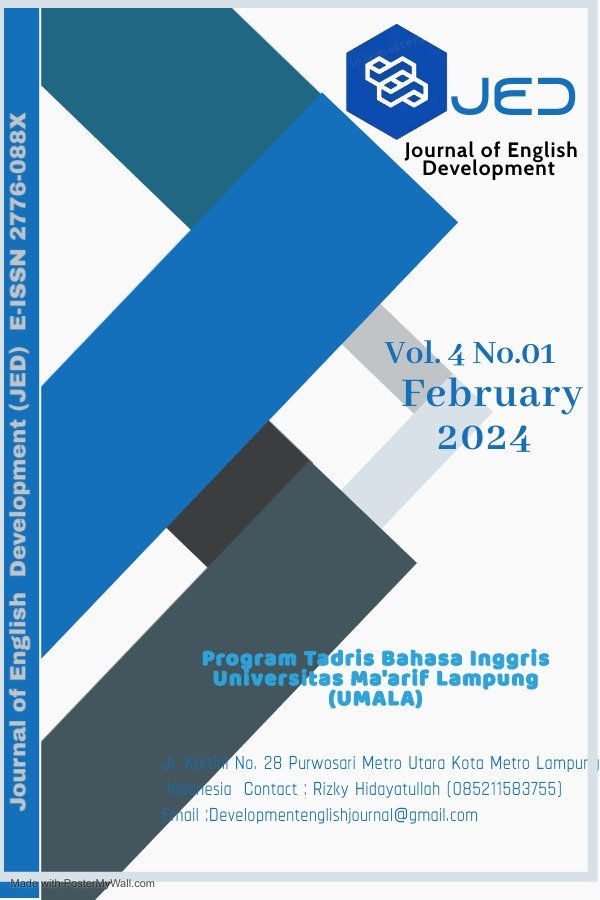Implementing Project-Based Learning Using Short Movies in English Writing Course
English
DOI:
https://doi.org/10.25217/jed.v4i01.4347Abstract
This research aims to determine the effectiveness of implementing project-based learning using short movie-making in English writing classes. This research uses quasi-experimental research with a one-group pre-test and post-test experimental design. The research was conducted in 14 meetings with 50 English writing class 31.3A students. The odd semester was 2023-2024. The research will be carried out from September 2023 to 2024 at BSI University Jakarta. Data is collected using observation, documentation and tests. The data analysis technique uses a two-sample paired t-test for the mean. The research results concluded that short movie-making projects carried out in groups can increase student interest in writing classes. Apart from that, it is also easier for students to develop writing ideas. So, students' English writing skills are better than before the short movie-making project was implemented. This can be seen from the t-test results showing t-Stat < t-table (5.4678 < 2.0095), meaning that the project of making short movies in groups is practical and improves English writing skills.
References
Alkhatnai, M. (2017). Teaching Translation Using Project-Based-Learning: Saudi Translation Students Perspectives. Arab World English Journal For Translation and Literary Studies, 1(4), 83–94. https://doi.org/10.24093/awejtls/vol1no4.6
Bell, S. (2010). Project-Based Learning for the 21st Century: Skills for the Future. The Clearing House: A Journal of Educational Strategies, Issues and Ideas, 83(2), 39–43. https://doi.org/10.1080/00098650903505415
Brown, D. (2007). Principles of Language Learning and Teaching. Pearson Education.
Cortázar, C., Nussbaum, M., Harcha, J., Alvares, D., López, F., Goñi, J., & Cabezas, V. (2021). Promoting critical thinking in an online, project-based course. Computers in Human Behavior, 119. https://doi.org/10.1016/J.CHB.2021.106705
Creswell, J. W., & Creswell, J. D. (2018). Research design: Qualitative, quantitative, and mixed methods approaches fifth edition. SAGE Publications Inc.
Ginting, K. L. V. B., Syafitri, D., Nehe, C. R. Y., Manullang, N. P., & Tarigan, S. N. (2019). Improving Students’ skill in Writing Narrative Text Through Animation Movie. Linguistic, English Education and Art (LEEA) Journal, 3(1), 230–237. https://doi.org/10.31539/LEEA.V3I1.1000
Gómez-Pablos, V. B., del Pozo, M. M., & Muñoz-Repiso, A. G.-V. (2017). Project-based learning (PBL) through the incorporation of digital technologies: An evaluation based on the experience of serving teachers. Computers in Human Behavior, 68, 501–512.
Goulet, M.-J., & Pelletier, L. (2017). Contents and Approaches to Technology in Digital Writing Instruction: Evidence from Universities of Two Canadian Provinces. Computers and Composition, 43, 73–87. https://doi.org/10.1016/J.COMPCOM.2016.11.007
Harmer, J. (2006). How to Teach Writing. Longman.
Hynninen, N. (2018). Impact of digital tools on the research writing process: A case study of collaborative writing in computer science. Discourse, Context & Media, 24, 16–23. https://doi.org/10.1016/J.DCM.2018.01.005
Ismaili, M. (2013). The Effectiveness of Using Movies in the EFL Classroom – A Study Conducted at South East European University. Academic Journal of Interdisciplinary Studies. https://doi.org/10.5901/AJIS.2012.V2N4P121
Kabooha, R. H. (2016). Using Movies in EFL Classrooms: A Study Conducted at the English Language Institute (ELI), King Abdul-Aziz University. English Language Teaching, 9(3), 248. https://doi.org/10.5539/ELT.V9N3P248
Kettanun, C. (2015). Project-based Learning and Its Validity in a Thai EFL Classroom. Procedia - Social and Behavioral Sciences, 192, 567–573. https://doi.org/10.1016/J.SBSPRO.2015.06.094
Kocoglu, Z. (2010). WebQuests in EFL reading/writing classroom. Procedia - Social and Behavioral Sciences, 2(2), 3524–3527. https://doi.org/10.1016/J.SBSPRO.2010.03.545
Kusumawardhani, P., & Nurhayati, N. (2019). THE ANALYSIS OF TEACHING WRITING TO ENGLISH YOUNG LEARNERS (EYL) THROUGH A MOVIE: AN ICT PERSPECTIVE. Wanastra: Jurnal Bahasa Dan Sastra, 11(1), 25–36. https://doi.org/10.31294/W.V11I1.5065
Li, X., & Wang, P. (2015). A Research on Using English Movies to Improve Chinese College Students’ Oral English. Theory and Practice in Language Studies, 5(5), 1096. https://doi.org/10.17507/TPLS.0505.26
Martinez, C. (2022). Developing 21st century teaching skills: A case study of teaching and learning through project-based curriculum. Cogent Education, 9(1). https://doi.org/10.1080/2331186X.2021.2024936
Meinawati, E. (2020). Enhancing English Academic Writing Ability Using Film and Streaming Project. Proceedings of the 2nd International Conference of Science and Technology for the Internet of Things.
Muhammad, M. (2020). Promoting students’ learning motivation through project-based learning using Muvizu in 21st-century education. Cypriot Journal of Educational Sciences, 15(5), 899–908. https://doi.org/10.18844/cjes.v15i5.5120
Pratiwi, N. P. K. A., Astawa, I. W. P., & Mahayukti, G. A. (2019). Missouri Mathematics Project (MMP), Pemahaman Konsep Matematika, dan Kepercayaan Diri Siswa. Jurnal Elemen, 5(2), 178. https://doi.org/10.29408/jel.v5i2.1317
Sabarun, . (2018). Needs Analysis on Developing EFL Paragraph Writing Materials at Kalimantan L2 learners. English Language Teaching, 12(1), 186. https://doi.org/10.5539/elt.v12n1p186
Sayuti, H. A. M., Ann, T. G., Saimi, W. M. S. A., Bakar, M. A. B., Dawawi, S. N. A., & Mohamad, M. (2020). Using Gold Standard Project Based Learning for Intermediate Year Three Pupils to Enhance English Speaking Skill: A Conceptual Paper. Creative Education, 11(10), 1873–1889. https://doi.org/10.4236/CE.2020.1110137
See, Y. G., Rashid, A. M., & Bakar, A. R. (2015). The Effect of Project Based Learning on Level of Content Knowledge of Pre-Vocational Subject. Mediterranean Journal of Social Sciences. https://doi.org/10.5901/MJSS.2015.V6N6S4P369
Silvani, D. (2020). Learning through Watching: Using Animation Movie to Improve Students’ Writing Ability. Journal of English Language Teaching and Linguistics, 5(2), 233–247. https://doi.org/10.21462/JELTL.V5I2.418
Vetter, M. A., McDowell, Z. J., & Stewart, M. (2019). From Opportunities to Outcomes: The Wikipedia-Based Writing Assignment. Computers and Composition, 52, 53–64. https://doi.org/10.1016/J.COMPCOM.2019.01.008
Vie, S. (2018). Effective Social Media Use in Online Writing Classes through Universal Design for Learning (UDL) Principles. Computers and Composition, 49, 61–70. https://doi.org/10.1016/j.compcom.2018.05.005
Weigle, S. C. (2002). Assessing Writing. Cambridge University Press.
Weigle, S. C. (2016). Second language writing assessment. Handbook of Second and Foreign Language Writing, 473–493. https://doi.org/10.1515/9781614511335-025/HTML

Downloads
Published
How to Cite
Issue
Section
License
Copyright (c) 2024 Euis Meinawati, Widia Yunita

This work is licensed under a Creative Commons Attribution-ShareAlike 4.0 International License.



